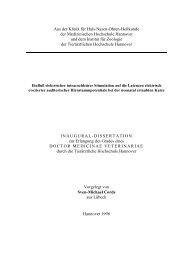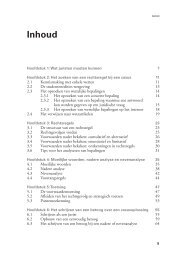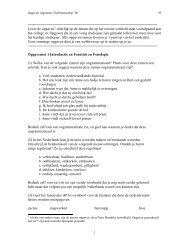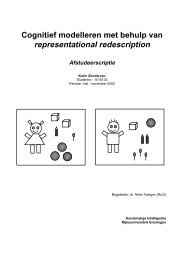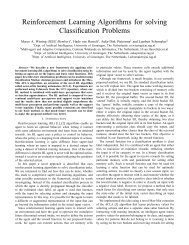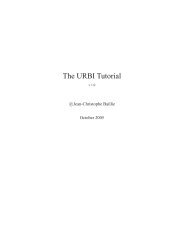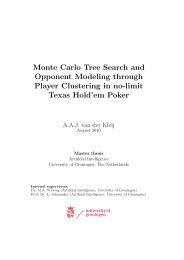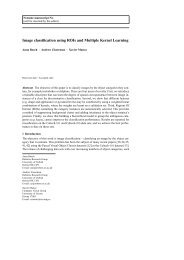Presuppositions in Spoken Discourse
Presuppositions in Spoken Discourse
Presuppositions in Spoken Discourse
You also want an ePaper? Increase the reach of your titles
YUMPU automatically turns print PDFs into web optimized ePapers that Google loves.
Accommodation and Presupposition<br />
There were several examples where it was hard to consider the presupposition to<br />
be a fact. It seems to be an op<strong>in</strong>ion that the speaker wishes the hearer to agree with<br />
or acknowledge, which <strong>in</strong> some cases they do and <strong>in</strong> some they don’t. It is hard to<br />
determ<strong>in</strong>e if signs of an expectation of agreement are signs that the speaker<br />
expected this to be part of the common ground, or only that they expected the<br />
hearer would agree to accept the presupposition. Here is one example:<br />
(17) factive, triggered p: this is very serious, this = the earlier list of events,<br />
considered (1-9 506)<br />
Speaker C yes#|<br />
Speaker a but [sa] . who else has been responsible for the Carriage and Pair the<br />
Duke of Preston the Apple Tree . do you know that this is *very serious<br />
- we‘ve lost . we‘ve lost several* pubs around here with<strong>in</strong> . sort of liv<strong>in</strong>g<br />
memory with<strong>in</strong> the last five or six years - and it means that the exist<strong>in</strong>g<br />
pubs they‘ve made no new pubs *.* and the exist<strong>in</strong>g pubs . which were<br />
. comfortably crowded before my God they‘re packed - you try to get<br />
<strong>in</strong>to the Scarborough for lunch now and it‘s just uncomfortable isn‘t it~|<br />
Speaker C * of town and country plann<strong>in</strong>g -#I mean [dhi dhi] BCC*#|<br />
Speaker A *no*#|<br />
Speaker B [m]#|<br />
Speaker ?? [m] .#|<br />
In the next example, the presupposition will need to be locally accommodated<br />
because the subject of the simple tense factive is the Speaker, and it would be<br />
epistemically <strong>in</strong>defensible to both presuppose the <strong>in</strong>formation <strong>in</strong> the complement<br />
and then deny that one was aware of it. It also seems to clearly be the speaker’s<br />
op<strong>in</strong>ion.<br />
(18) factive, triggered p: those cont<strong>in</strong>ued supply of funds was justified considered<br />
new, (Local) (2-8a 473)<br />
Speaker B but how would . I mean hav<strong>in</strong>g said that# at what po<strong>in</strong>t would you have<br />
changed it# and how would you have changed it#|<br />
Speaker A well I mean -# [@ dh@ dh@s] they were keen on ma<strong>in</strong>ta<strong>in</strong><strong>in</strong>g the<br />
status quo#<br />
because they kept gett<strong>in</strong>g funds from England .#|<br />
Speaker B well~|<br />
Speaker A I don‘t see that those cont<strong>in</strong>ued supply of funds was justified -#|<br />
Speaker B but then would you have them all thrown out of work# I mean it‘s the<br />
Catholics *. the Catholic m<strong>in</strong>ority*#|<br />
5.2.2 Discussion<br />
What do these results tell us about presuppositions and their function, factive<br />
presuppositions <strong>in</strong> particular? These results confirm what has been shown with itclefts<br />
and def<strong>in</strong>ites: that presuppositions can be used as a means to <strong>in</strong>tentionally<br />
communicate <strong>in</strong>formation that is hearer-new. For factives this function is far from<br />
unusual, be<strong>in</strong>g the ma<strong>in</strong> usage of examples found <strong>in</strong> the corpus data. Why then, do<br />
115



